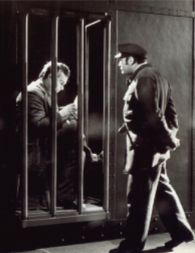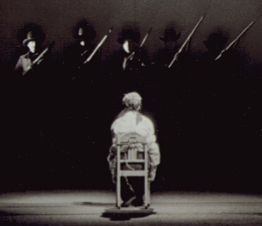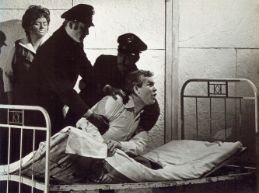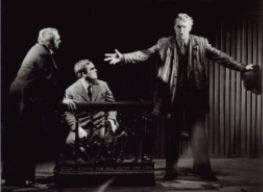|
|
 |
 |
 |
| Joe Hill in his prison cell |
|
 |


|
 |



The world premiere took place at the German State Opera, Berlin on 29th September 1970. BBC Radio 3 broadcast the opera in 1979 and that broadcast was repeated twice.
Ossia Trilling wrote the following review of the world premiere of the opera in The Guardian, on the 6th October 1970:
"Like his earlier operas of class struggle and human destiny, Alan Bush's 'Joe Hill' was commissioned by an East German opera house. Based on Barrie Stavis' 'The Man Who Never Died', it received its first performance in a lavish production by Erhard Fischer at the Deutsche Staatsoper in Berlin. The bass, Herbert Rossler, on loan from the Komische Oper, sang Ed Rowan, Joe Hill's friend and fellow labour organiser in Salt Lake City, with deep-felt eloquence. Erich Witte sang the shifty Harry Macrae, head of the private detective agency which helps the Utah copper magnates and the police to pin on Joe Hill a vicious murder for which, in this version, though patently innocent, he is to die a martyr's death by firing squad…
Joe is thus changed from the happy-go-lucky Swedish immigrant with human foibles but an iron will. He becomes an idealised working-class tragic hero whose only flaw lay in his stubborn loyalty to the losing side in the battle against the two faces of American big business and a venial judiciary in the early years of the century.
This is mirrored impressively in Bush's score, which takes much of its colour from American folk song, both white and black, and allots to the villains a vocal asperity that is wholly tonal, yet shaded with strangely menacing intervals. Some of Hill's own songs are woven into the music, none more neatly than the three that merge into the final chorus and bring the didactic musical drama to its thrilling climax.
 |
| Joe Hill’s execution |
 |
|
The mounting battle for Joe's life is translated musically either in Sprechgesang or with rhythmical lushness that aims at a compromise between the traditionally rousing war-chant of the striking worker and expressive lyricism. The last, as in the bitter-sweet love duet between Joe and Martha, the married woman Joe loved secretly and refused to betray, or that between the imprisoned fighter and his friend, Ed Rowan, Bush manages to endow with unusual sophistication. A song like 'We shall not be moved,' deliberately manipulated for the large chorus, is heard twice: once, with vigorous realism in a 'demo', and again, with symbolic dynamism over the loud-speakers, to usher in the death-dealing rifle shots.
Orchestra, well-drilled chorus, and singers, headed by the handsome baritone Erich Siebenschuh as a sturdily passionate Joe Hill, all create a memorable feast for eye, ear, heart and mind, and a stirring introduction to the 1970 East Berlin Arts Festival."
| Joe Hill, militant American trade unionist |
Baritone |
| Ed Rowan, one of Joe's Union friends |
Bass |
| Ben Winton, a negro, another of Joe's Union friends |
Tenor |
| Tom Sharpe, a false friend |
Tenor |
| Isadore Rabinowitz, another of Joe's Union friends |
Baritone |
| Another speaker |
Baritone |
| Harry Macrae, private detective |
Tenor |
| Adam Steele, his assistant |
Tenor |
| John Moody, copper-mine owner |
Bass |
| Paul Blake, Police Chief |
Baritone |
| Hilda Winton, Ben's wife |
Mezzo-Soprano |
| Martha Weber, Joe Hill's girl |
Soprano |
| Henry Weber, her husband |
Bass |
| Italian worker |
Tenor |
| Greek worker |
Baritone |
| Gordon, a policeman who arrests Joe Hill |
Baritone |
| O'Leary, a policeman who arrests Joe Hill |
Tenor |
Mixed chorus of I.W.W. Members and Supporters
(Male Chorus only in Act 1; Mixed Chorus in Act 2) |
|
| Mike Daly, a prison guard |
Bass |
| Scott McBride, a crooked lawyer |
Tenor |
| William Weathersee, District Attorney |
Bass |
| Judge Benjamin Mitchell |
Tenor |
| Alexander Marshall, Joe Hill's attorney |
Bass-Baritone |
| Martin Henderson, a boy of 13 |
Mezzo-Soprano |
| Viola Healy |
Mezzo-Soprano |
| Reverend Bernard White |
Contralto |
| William Weed, Governor of Utah |
Baritone |
| Two witnesses |
Mezzo-Soprano |
|
Soprano |
| Engineer |
Baritone |
| Cowboy |
Tenor |
| Guard |
Bass-Baritone |
| Messenger |
Baritone |
| Firing Squad Captain |
Speaking part |
| Chief Justice Axel Cooley |
Baritone |
| Attorney General Stone |
Bass |
| Judge Fred Veitch |
Tenor |
| Judge Alfred Beard |
Bass-Baritone |
Place: A Western City in the United States of America.
Time: It begins in the year 1914 and ends with the execution of Joe Hill on 19th November 1915.
(Unlike the previous three operas, the two acts are divided into short scenes or episodes, which often merge into one another, the actors of the previous 'scene' merely 'freezing' until the spotlight turns on them again. But, the progress of the story can be seen from identifiable changes of scene, which are outlined.)
The historical events on which the opera 'Joe Hill' is based took place in Salt Lake City, Utah, USA, in 1915. Joe Hill was born in Sweden and emigrated to the United States at the age of 19 in 1901. He became a member of a large Labour Union called the Industrial Workers of the World, popularly known as the 'Wobblies'. The aim of this union was to organise workers of all trades and was open to both whites of all nationalities and to negroes.
Joe Hill is helping to organise a strike against the bad conditions in the copper mines in Salt Lake City. All meetings have been banned by the police. Nevertheless, the I.W.W. is holding a street-corner meeting.
A street corner of a Western city in the USA. About a dozen men enter, including Joe Hill, Ed. Rowan, Tom Sharpe and Ben Winton, a negro. The flag-pole and soap-box are set up. Joe Hill opens the meeting by singing one of his own songs; when the police seizes the first speaker, his place is immediately taken by another Union member and then another. So many are arrested and taken to prison during the days that follow that the goals are full to overflowing and the whole legal system is disrupted.
 |
| Joe is arrested |
 |
|
The office of Chief of Police, Paul Blake. The copper magnate, John Moody, discovers that Joe Hill is responsible for this tactic and is determined to destroy him with the aid of his detective thugs and the police of the city. A meeting takes place at the office of Chief of Police, Paul Blake, at which a plan is worked out by Tom Sharpe, a member of the I.W.W., who is in the pay of Moody, and who admits he hates Joe Hill. Joe is loved by the union men, and he is loved by a married woman, Martha Weber, who is married to a drunkard. Tom Sharpe arranges for Henry Weber to interrupt a meeting of the lovers, at which he is to shoot Joe Hill dead.
At the I.W.W. Union Hall. A strike meeting is taking place, at which a strike committee is formed. The meeting is addressed by Joe Hill, who urges solidarity and the creation of one industrial union - 'There is power in a band of working men, when they stand, hand in hand. That's a power that must rule in every land'.
Martha Weber's room. Martha is seating at a table, engaged in piece-work, which is terrible drudgery. As she works she sings happily that Joe will come. Joe enters in high spirits, kisses her and then sits down to help her at her work. He shows Martha a leaflet advertising the strike. Martha sings of her unhappy life with her husband. They sing a love duet of the happiness they hope to share in their future life together.
Henry Weber enters, followed by Tom Sharpe. Henry is dangerously drunk and carries a pistol; he is threatening to kill Joe Hill. Martha throws herself at Henry before he shoots. Joe Hill is hit but tells Martha to escape before the police come, and then staggers out. Tom Sharpe then makes a signal and three of Moody's thugs enter, seize Martha, gag her, and two of them carry her off. The third man carries Henry off. They are never found again.
The office of the Macrae Detective Agency. Tom Sharpe describes how Henry Weber failed to kill Joe Hill. A plot is hatched to frame Joe Hill for the murder of a grocer, Mr. Henderson, by a masked gunman the previous night.
Joe Hill's room in Ben and Hilda Winton's house. Joe is lying in bed, in pain and exhausted. There is a banging on the door and two policemen, Gordon and O'Leary arrive and arrest Joe Hill on a murder charge and Joe is taken away. The scene ends with Hilda and Ben putting the room in order, and singing defiantly that 'We will not be beaten'.
Joe Hill's Prison cell, six weeks later. Joe Hill is alone in his prison cell, where he awaiting trial for the murder of Henderson. He is composing a song. He is now visited by a crooked lawyer, Scott McBride, who offers his services to Joe Hill free.
 |
| Joe's trial |
 |
|
The Salt Lake City County Court-room. The trial begins, but McBride makes no effective effort to defend Joe, who dismisses him and defends himself. He re-examines the key witness, Miss Healey, who has been persuaded to identify him as the wanted man. Joe Hill effectively shows up the falsity of her statements.
In the meantime, Ed Rowan, secretary of the local branch of the I.W.W., has persuaded Alexander Marshall, a famous advocated, to take over the case. Yet owing to the tactics of the prosecuting counsel, the case is lost and the desired outcome, Joe Hill's death sentence, is arrived at. Marshall convinces Joe that his case must be brought before the Appeals Court of Utah.
Two Joe Hill Defence Meetings are taking place. Two defence meetings are taking place simultaneously and meet in the middle of the stage. Countless resolutions of protest are coming in from other parts of America and from all parts of the world.
In the Chamber of the Utah State Supreme Court. Joe Hill appeals to the State Supreme Court. The search for Martha and Henry Weber, the two key witnesses to the original shooting of Joe Hill has proved fruitless and Joe Hill cannot bring any proof of his innocence; the death sentence is upheld.
The Court of Pardons. Joe Hill then appeals to the Board of Pardons, consisting of the same three judges who had sat in the State Supreme Court. Again the conviction is upheld. The Board of Pardons receives a telegram from President Wilson requesting a fresh trial and as a result 14 days reprieve are granted. Alexander addresses the Board in a final plea for his life: Joe Hill speaks 'for the poor - for the weary, for that long line of men - who have born the labours of the human race. Their eyes are upon you five men to-day'. The Attorney-General Stone asks Marshall if he had laid claim to any new facts and when Marshall replies in the negative, sentences Joe Hill to death on 19th November 1915.
Joe Hill's Prison cell. Joe, on the night before his execution, is visited in his cell by his friend, Ed Rowan. Outside the prison many people have come to sing his songs at twelve midnight; Joe Hill replies that when they sing, he will answer. He asks if there is any news of Martha and Henry Weber, the only people who could provide him with an alibi, and when Ed Rowan replies in the negative, Joe Hill replies that he thinks Martha is dead. Joe Hill gives Ed Rowan two poems, one of which is his last will and testament. Two guards enter, handcuff Joe Hill and place him on a kitchen chair, binding his arms and legs to the chair. An order is given, and the firing squad shoot. Joe Hill's head slumps forward.
Epilogue. There is a funeral procession for Joe Hill. The coffin is moved to the centre of the stage. John Moody and Harry Macrae look out of an upper-floor window, but are silent. The opera ends with a chorus of hope and defiance, 'Joe Hill will never die'.
© Rachel O'Higgins, Alan Bush Music Trust, 2001
|
 |
|
